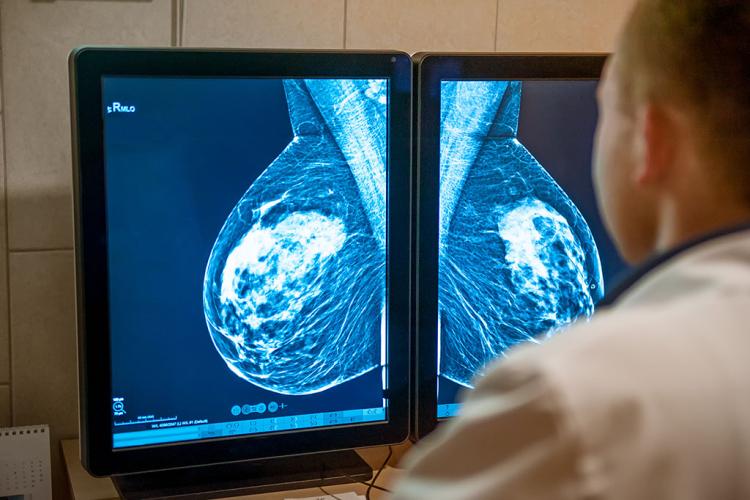Licensing opportunities
We are the second biggest oncology out-licensor globally and have a wide variety of oncology-focused projects available for licensing or collaboration...


The topic of data sharing in cancer research isn't new. A decade ago, Cancer Research UK (CRUK)'s former chief clinician, Prof Peter Johnson, spoke to BBC News about the benefits it could bring, but it was - and remains - a topic that divides opinion.
It’s an area of cancer research that holds huge promise. Yet, as a community we are struggling to make the most of it. Technological and scientific advances over the last decade have dramatically increased the amount of data that cancer research projects generate. Advanced analytics, which has the potential to extract additional insights from the data, has also exploded. But data quality and sharing opportunities are currently limiting the use of these approaches and as a result, patient benefit is not being maximised.
Some of the constraints are practical, such as challenges with data collation and management. Others are related to researchers’ abilities to obtain the appropriate permissions to use and share these datasets. This is especially true for patient-derived data, some of the most useful data for research teams and commercial enterprises searching for new approaches to cancer detection and treatment. The value in these large, complex data sets are the patterns they contain. Extracting these insights is extremely challenging, requiring specialised knowledge and advanced computational power, and it also requires appropriate ethics and regulatory approval. These can be complex and hard to secure, particularly if patients are not appropriately consented for this type of further use at the start of a research project. Without these approvals, the potential patient-derived data holds for driving biotech innovation cannot be realised.
Last month, Tony Blair and William Hague published a report titled A New National Purpose. In the report, they discussed how the UK could maximise returns from the biotechnology and AI revolution, thanks to one of the most valuable patient-derived data sources in the world – data within the NHS. Sharing this data with innovative companies specialising in developing new technologies and treatments could ultimately benefit huge numbers of patients in the UK and worldwide.
But sharing patient-derived data – be it from a research project or from public health bodies such as the NHS – with commercial partners is not as common in the UK as it could be. Reasons for this are multi-faceted and include valid concerns around trust and privacy. Patients can be reluctant to agree to their data being used by commercial organisations and there is a need for better communication around how their data will be used.
According to the Nuffield Trust, as of October 2023 around 5.4% of people have opted out of sharing their NHS data (totalling just over 3.3 million people). This has stabilised since a large spike in the summer of 2021 when there was controversy around the de-identification process.
Yet, if we are to maximise the impact of data for patient benefit, we must partner with companies specialised in advanced analytics. These companies have the technological skills and budgets required to develop new technologies and extract insights at speed.
If we are to enable this, as a sector we must understand and address the valid concerns people have around commercial data sharing. At Cancer Research Horizons, we feel this can only be overcome through patient involvement in every stage of the licensing process. We have been working closely with patient advocates since the creation of our data strategy to develop processes that enable safe, secure and transparent commercial data partnerships.
This has informed our Guiding Principles for Data Partnerships. These are designed to protect patients, as well our partners and our data. Covering four key areas – transparency and accountability, data security and management, protecting academic research, and fair partnership, these principles help to ensure that all partnerships involving patient-derived data have clear benefits for people affected by cancer, are without unacceptable risk, and that they represent emerging best practice.
We are now seeing results from this consultation process in the form of commercial data-sharing agreements for CRUK-funded datasets. One example is OPTIMAM, a large, curated database of de-identified mammogram images and associated clinical data collected from NHS breast screening programme sites across the UK. The size, diversity and longitudinal nature of this data makes it highly valuable, and the database has been designed to be shared for research and commercial applications, including in virtual clinical trials, computer aided detection, artificial intelligence enabled image analysis, image perception studies and training and quality assurance.
Cancer Research Horizons and CRUK have established 20 commercial license agreements to enable access to this data set. One of these agreements is with Google Health, who are using de-identified OPTIMAM data to develop and test AI based tools to help radiologists interpret mammograms more effectively.
S:CORT is another CRUK-funded database which has been successfully shared with commercial entities. This annotated molecular genomics dataset focuses on colorectal cancer and is now being used by three commercial organisations, with a further four licences currently in discussion.
OPTIMAM and S:CORT are two of three datasets we have secured commercial data partnerships for in the last three years. We are currently actively negotiating commercial partnerships for another two assets within our portfolio, with a further seven at an earlier stage of discussions. We know that data collation, management and storage challenges prevent numerous other research groups from sharing their data sets in this way. To help tackle this, Cancer Research Horizons has established the Data Innovation Awards, which provides funds to help scientists make their datasets more accessible and useable for third parties.
A great example of the value of this award is the CRUK-funded Bladder Cancer Prognosis Programme that saw the collection and analysis of bladder cancer samples and clinical data over a 10-year span. They were awarded a Data Innovation Award in 2022 to fund the creation of a searchable and user-friendly data warehouse, enabling the group to make its data AI-ready and helping to maximise its value for research by academic and commercial partners, and ultimately for patient benefit. The project, due to complete this year, has already resulted in enquiries from both academic and commercial parties.
At Cancer Research Horizons we believe that commercial data partnerships are valuable to the translation process. But it’s imperative that these partnerships are designed in a way that will benefit and protect patients. Transparency, accountability, security and trust are all essential to achieving this and I’m pleased that we are playing a leading role in ensuring that these values are central to patient-derived data partnership agreements going forwards.